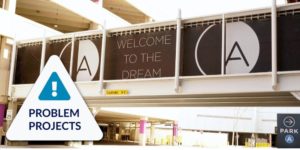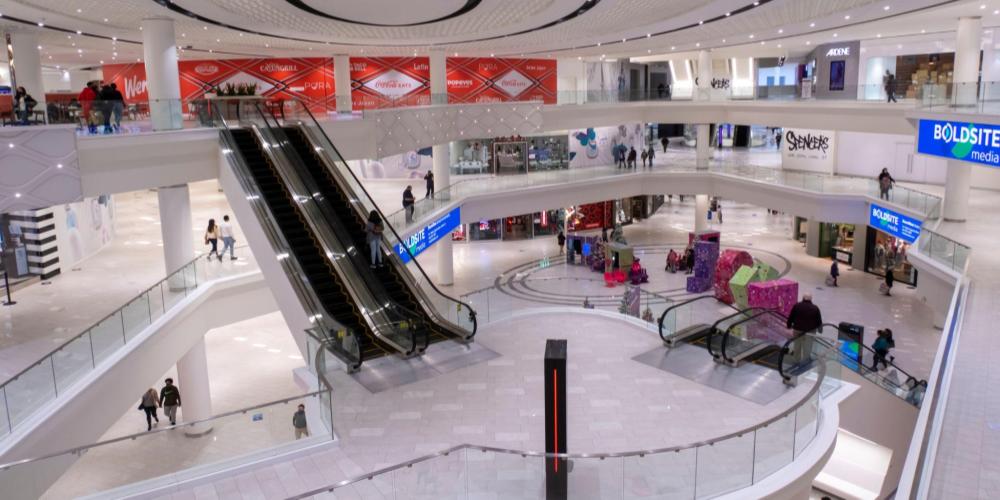
After a lengthy process of opening its American Dream Mall in East Rutherford, New Jersey during 2019 and 2020, Canadian developer Triple Five Worldwide faces mounting debt — and with it, the prospect of losing even more profit from the company’s other flagship projects.
Since opening, the mall has struggled from situations somewhat outside its control, with company executives looking to the pandemic for much of the mall’s issues. After a soft opening in October 2019, Triple Five had to abandon its grand opening in spring 2020, ultimately remaining closed from March 16, 2020, to October 1, 2020.
“The timing could not have been worse in terms of the pandemic,” said Triple Five Senior Vice President of Development Kurt Hagen in March 2021. “This created a very significant cash flow crisis at the American Dream Mall.”
In order to receive the $1.2 billion loan Triple Five took out in 2017 to finance the over $5 billion project, the company agreed to offer 49% of profits at Bloomington, Minnesota’s Mall of America and Edmonton, Alberta, Canada’s West Edmonton Mall.
The loan included collateral provisions set to trigger upon defaulted payments, which now puts Triple Five in the position of handing over significant profits from its other flagship properties.
The lending group is led by JP Morgan, and additionally involves Goldman Sachs, Starwood Capital, CIM Group, Soros Fund Management, Wafra, and iStar. A report from the Financial Times noted that the process of restructuring the ownership of the properties was in its final stages in late March 2021.
However, the company has maintained that its operations will not be affected by the restructuring. Hagen noted that the loan’s provision doesn’t include property or assets, adding that “[restructuring] simply means that once we return to profitability, 49% of those profits would go to the American Dream lenders until such time as that collateral is released.”
Though the amounts of its loan defaults are unspecified, recent public financial records showed that Triple Five lost $64 million over the American Dream complex in 2020.
“It would have been better [if] the American Dream Mall would have burned down, or a hurricane had hit it, financially, because we would have been covered by insurance.”
Kurt Hagen, Triple Five Senior Vice President of Development
Contractors have struggled to receive payment from work on the American Dream Mall
Triple Five’s cash flow crisis has impacted more than just its own loan payments — as of March 2021, contractors had filed more than $41 million in construction liens against the complex.
Construction liens — also known as mechanics liens — are legal claims for nonpayment related to construction work. In case of nonpayment, filing a mechanics lien can allow a contractor to gain a security interest in a project’s property.
Though Triple Five has worked to pay off a number of its construction debts, the amount that it currently owes is still daunting for the company in the face of such cash flow problems, and large contractors have struggled to receive full payment.
Learn more – Managing Cash Flow in Construction: Problems & Solutions
According to Levelset records, contractor PCL Construction, Inc. has at least $16,348,750.02 of active liens against property at the American Dream Mall complex. However, this is just a small amount of the contractor’s overall contract — the company said in April 2021 that it had been paid $1.9 billion out of an over-$2-billion fee.
The wide range of work needed on the project has led to the effects of the mall’s cash flow issues impacting a wide range of companies, from construction contractors, to manufacturing and equipment management.
Among the contractors affected by incomplete payment over the project are:
- Bonland Industries, Inc.
- National Fireproofing Insulation Co., Inc.
- Johnson Controls Fire Protection, LP
- DSR Group, LLC
- ID3, LLC
- United Rentals, Inc.
- VA Spatz and Sons Construction, Inc.
- Meadowlands Fire Protection Corp.
- Dant Clayton Corp.
- FINE Group, Inc.

Multiple lawsuits have also been filed over the mall’s financial issues — specifically to foreclose on mechanics liens. Filing a lien is often enough to secure payment, making lien foreclosure relatively uncommon. However, this step may be necessary after a lengthy period of nonpayment.
A March 17, 2021, suit filed by Sordoni Construction Co. requested $2,622,572.51 plus interest and attorneys’ fees following a prior lien, and Berlin Steel Construction Co. followed suit with a lawsuit on March 23, 2021, over nonpayment of $614,542.31 (as well as interest and attorneys’ fees).
Beyond contractors, stores within the mall are also looking to extricate themselves from Triple Five’s problems. An April 8, 2021, lawsuit filed by the American Sports Winter and Outdoor Company requested its lease with the complex be terminated — alleging that, after the mall’s general reopening on October 1, 2020, Triple Five kept sections of the mall “closed for its own financial benefit” — and the detriment of the affected businesses.
Unless American shopping habits return to their focus on in-store shopping, Triple Five’s malls may continue to struggle with profitability and cash flow. Kurt Hagen reiterated the difficulty of the pandemic in wrapping up its cash flow issues in a public meeting of the Bloomington, Minnesota city council and port authority, noting that “Not opening and not being able to generate any cash for six months created some very significant problems.”
“It would have been better [if] the American Dream Mall would have burned down, or a hurricane had hit it, financially, because we would have been covered by insurance,” Hagen added.
New Jersey Sierra Club director Jeff Tittel further pointed to a difficult path forward for complexes like the American Dream Mall, saying “I have always said retail is changing and a mall made no sense then, and it makes no sense now…There are seven or eight malls within a 10-mile radius, plus shopping in New York.”